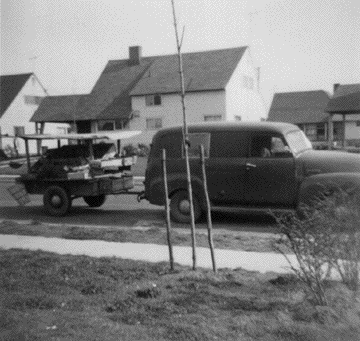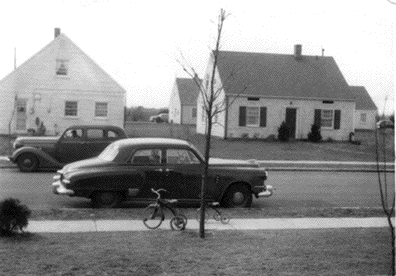|

A grocer searches for customers in Levittown, on Long Island
in 1953.
Unfortunately, he didn't find many, because they were at the
new supermarket.
Economic Health Versus Growth
by Juan Wilson
© 1993 The Gobbler
Over the last several years, I have participated
in several conversations about the need for jobs, the sorry
state of the local economy and the problems associated with
poverty. Participants in these conversations blamed everything
from television to Japanese trade practices as the source of
our economic woes.
Underlying all these conversations was the
idea that a healthy economy is one that must grow. The more
widespread and quicker that growth, the sooner we'd find answers
to our problems. All we had to do was find the means to make
things grow bigger and faster. This is an assumption that I
have held my whole life because it was an idea everyone, whether
rich or poor, seemed to endorse.
I am now beginning to question that assumption.
I'm 48 years old and have lived through three periods of conspicuous
growth. The first was during the explosion of suburban development
in the early nineteen fifties following World War II. General
Dwight D. Eisenhower was President, and America fell asleep
every night watching gunfights acted out in TV westerns and
John Wayne war films. The second growth period were the Go-Go
years of the late sixties during the presidency of Lyndon B.
Johnson. We had a national policy of Guns & Butter. A War
on Poverty and a War in Vietnam. Americans ate dinner every
night watching young Americans die in Southeast Asia and urban
riots in city after city across America. These were real gunfights.
Like many of you, I also remember the last
economic boom, during the yuppie 1980's, when Ronald R. Reagan
was President and two-bedroom bungalows in gentrified suburbs
sold for $350,000. A time when junk bonds, bank failures and
debt made a few rich and everybody else poorer.
In my recollection of these times it does not
seem that life overall was any better for Americans than it
is now. On the contrary, had the accelerated growth of those
times continued unabated until today, we might be worse off
today than we are. Pollution, depletion of natural resources,
overpopulation, debt and other serious problems might have engulfed
us.
I was not distant or disconnected from the
places of growth in those economic "good times". In the 1980's
I lived in suburban Connecticut and in the late forties and
early fifties my family lived in a series of mass produced tract
homes, as suburban growth swallowed up and paved over the potato,
duck, and horse farms of central and eastern Long Island.
When I was a boy I rode a bike along Old Country
Road near our tract home. At that time, it was an old road with
mature trees on either side, that joined branches overhead.
There were farm stores and other small owner-operated businesses
sprinkled along its path.
Believe me, you wouldn't want to ride a bike
along Old Country Road today. Old Country Road is now a six
lane commercial strip with windowless national franchises butted
parking lot to parking lot. It dwarfs what we see today on nearby
Fairmount Avenue. Just imagine looking out your picture window
one morning when the chain saws begin cutting down the big trees
across the street, which edge the flowered meadow that will
shortly become a blacktopped parking lot for heaven knows what
operation.

Stone Lane, Levittown, Long Island in 1950. the motto: "One
house, one car!"
This suburban growth on Long Island has in
no way relieved the problems of New York City. In fact, things
got worse. New York's population wasn't reduced much, but the
population of Nassau and Suffolk counties on Long Island increased
by tenfold. Activity in the suburbs sapped the economic strength
of the city. Paradoxically, many of the voices raised loudest
for more economic growth in New York State are in the very places
where the fastest and most intense growth has done the greatest
damage.
If you are a politician running for office
in America it is safe to call for more growth in front of almost
any audience. This is true for Republicans or Democrats. The
Democrat will tell you that growth is good for the "little guy".
More jobs for the unemployed, less poverty, etc. The Republicans,
on the other hand, will tell you growth is good for corporate
America and business in general. More opportunities to get rich,
less poverty, etc.
Both political parties advocate economic growth
as a fix for our problems. There was a long period of time when
we in America could turn in the direction of the west for a
growth fix. For a while we had a few thousand miles of resources
in front of our growing population to rely on in a pinch: there
were plenty of virgin forests, minerals, oil and gas reserves
with no end in sight. I think the time for a simple solution
that employs expansion and growth to achieve economic good times
has passed us by.
Instead of talking about economic growth, I
feel we should be talking about economic health, economic harmony
and economic improvement. These aspects of the economy would
be measured in sustainability, fairness, and the quality of
life. We ought to be pointing to the quality of the work we
do and the quality of the products we produce and not just the
"bottom-line". As long as we cannot be turned from using growth
and its profits as the primary measure of our overall well-being,
we will be doomed to disappointment in what will be perceived
as a smaller and smaller world.
|